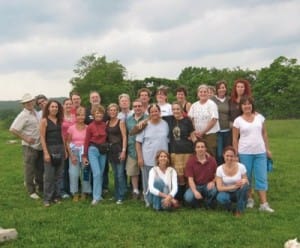We are all born with natural desires: to be accepted unconditionally, to be safe, and to love and be loved. Some of us, perhaps influenced by genetics, our home environment or early life experiences, deviate from who we truly are and go into survivor mode. In that mode, we choose defenses like addictions and eating disorders to cope with emotional pain. While these defenses need to be addressed, they are essentially symptoms of a bigger problem. This is the philosophy of Buddy Horne, a clinical specialist at The Ranch who works with men and women struggling with addictions, eating disorders, emotional trauma and other mental health issues. At The Ranch, clients address what caused them to deviate from their original course and begin the healing process that continues for the rest of their lives. Most clients who arrive at The Ranch believe they need help overcoming an addiction or mental health issue. What they discover is that they actually have been searching (in all the wrong places) for their authentic self. “A confusion many people have is that they are their addiction or eating disorder,” Buddy says. “They come in trying to get rid of a specific problem, but soon find that there are no external solutions to internal problems. They have to get to the root causes and heal from the inside out.” Talking the Talk, Walking the Walk Buddy developed these insights from firsthand experience. For 17 years, he has been in recovery from addictions to alcohol, sex, money – anything that would keep him from feeling and offered some sense of control. “Because money was my higher power, I didn’t want to invest in treatment,” he explains. “I tried over and over to recover on my own but eventually realized I needed help.” Buddy went into primary treatment followed by four months of extended care and one year in a halfway house. During treatment, he finally addressed his extensive, traumatic history of physical and sexual abuse and, for the first time, opened himself up to vulnerability and shared his story with others. By removing addictions as his higher power and connecting to God as he understands Him, Buddy discovered what he had been searching for all along: his authentic self. “In treatment I learned that you can’t do it halfway. Surrender is at all costs, and cannot be done with half measures, as they say in AA,” Buddy says. “People come to us wanting to give 25% and get 25% or more back, but recovery doesn’t work that way. You have to let go 100% to be able to get the benefits of this process. But that benefit is getting your life back.” When he speaks to clients at The Ranch, Buddy explains, “I have sat in your chair before. I know what it’s like to come into treatment and have an issue you can’t deal with by yourself. It’s a big risk to ask for help, and I have tremendous respect for anyone who is willing to take that risk.” Trust is a major obstacle for trauma survivors, but clients at The Ranch find that they can relate to Buddy because of his own experiences and his ability to challenge them with a mix of honesty, love and integrity. “God has blessed me with something that helps people trust me right off the bat. I do my best to talk the talk and walk the walk,” he says. “Because I speak from my own experience, not just things that I read out of a book, I build rapport with clients quickly.” Hope Restored Following treatment, Buddy began to rebuild his life one piece at a time. Wanting to give back, he started working as a chemical dependency technician in a 28-day treatment facility. He became a certified sex addiction therapist, trained by Patrick Carnes, and developed an interest in the relationship between trauma and addiction. Later, Buddy went on to become a primary therapist at a 12-Step based treatment center for men, and an addictions therapist at the Northern Arizona Veteran’s Administration focusing on the treatment of PTSD and addiction. What stood out to him was how long these veterans had been suffering and their desperate need for hope. “Once I made it to the other side of addiction, I felt that I had an obligation and willingness to turn around and help restore hope to others,” Buddy says. “No matter how far a person has gone or how bad it has gotten, there’s always hope. People told me that and thankfully I believed them.” Holistic Treatment at The Ranch In 2007, Buddy brought his no-nonsense approach and passion for helping others to The Ranch. “The Ranch brought me back to Tennessee, the roots of where I got sober,” he says. “When I first drove up and saw the 2,000 acres of beautiful scenery, I imagined the clients at the VA and how much they would’ve been healed by being in that environment instead of a hospital. Just driving up to ranch country disarms your defenses.” In addition to the peaceful setting, The Ranch’s holistic mind-body-spirit approach caught Buddy’s attention. Trained in Eye Movement Desensitization and Reprocessing (EMDR) and Brainspotting, he has a passion for using experiential therapies as part of his trauma-based approach. These techniques, he explains, help clients access their emotions and the deepest desires of their hearts. “Using experiential therapy, I have the opportunity to help clients with unhealthy core beliefs like ‘I’m defective’ or ‘I’m not good enough’ come around and see the truth that they have intrinsic value that no one can take away from them,” Buddy says. “Freed from the past, the glow comes into their eyes. There’s nothing better than to see people who are suffering come alive right there in front of you.”
Call for Immediate Help:1.844.876.7680

